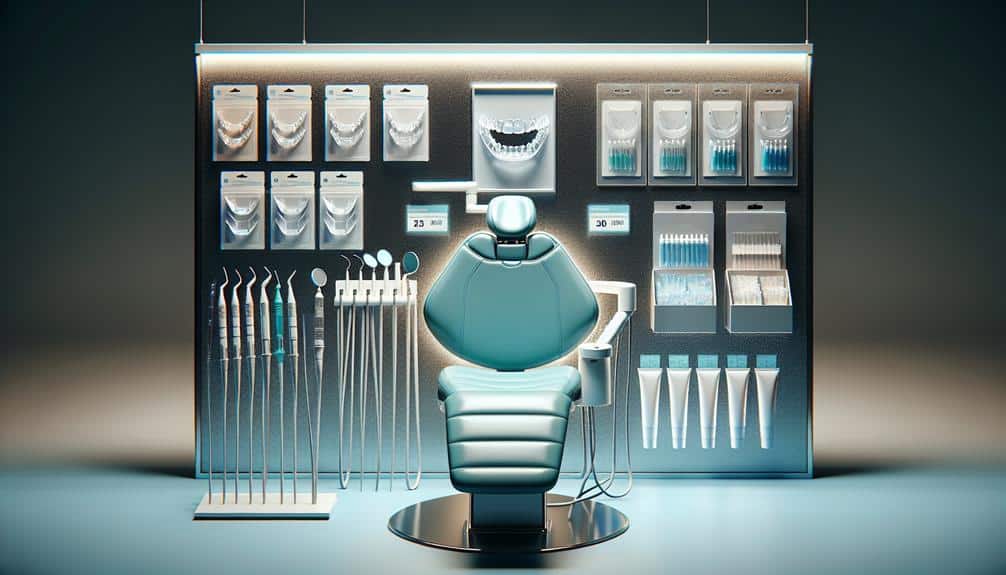To maximize your tax deductions for teeth whitening, make sure the procedure addresses a specific dental health issue to be eligible for a deduction. Keep detailed records, including receipts, to substantiate teeth whitening expenses. Consulting with a tax professional can help navigate IRS regulations and maximize deductions. Strategic planning, bundling medical expenses, and utilizing accounts like HSAs or FSAs can optimize your tax benefits. Familiarize yourself with IRS guidelines, deduction limitations, and commonly overlooked deductible expenses for a thorough approach towards maximizing your tax deductions for teeth whitening.
Key Points
- Teeth whitening must address a specific dental health issue to be deductible.
- Keep detailed records and receipts of all teeth whitening expenses.
- Utilize Health Savings Accounts (HSAs) or Flexible Spending Accounts (FSAs) for tax benefits.
- Schedule treatments strategically to maximize deductions, especially towards year-end.
- Consult a tax professional to ensure adherence to IRS guidelines for deductions.
Eligible Teeth Whitening Expenses
To determine eligible teeth whitening expenses for tax deductions, carefully review the specific criteria outlined by the Internal Revenue Service. When it comes to cosmetic procedures like teeth whitening, the IRS typically doesn't consider them as eligible medical expenses unless they're medically necessary.
For teeth whitening to qualify as a deductible expense, it must be deemed necessary to treat a specific dental condition that greatly impacts your health. This means that solely cosmetic reasons, such as desiring a brighter smile, wouldn't meet the criteria for a tax deduction.
However, if your dentist can establish that the teeth whitening procedure is essential for your oral health, such as removing stubborn stains that are causing decay or gum disease, then it may be considered a legitimate medical expense.
Documentation Requirements for Deductions
Guaranteeing proper documentation for your deductions is vital for substantiating the eligibility of your teeth whitening expenses for tax purposes. To maximize your tax benefits, it's essential to keep detailed records of your teeth whitening expenses, including receipts from your dental provider. Receipt verification is fundamental to proving the authenticity of your expenses to the Internal Revenue Service (IRS). Make sure that the receipts clearly outline the cost of the teeth whitening procedure, any related products or services, and the date of the treatment.
Furthermore, it's important to be aware of the deductible limits set by the IRS for medical expenses, including teeth whitening. As of the current tax laws, you can only deduct medical expenses that exceed 7.5% of your adjusted gross income. It's advisable to consult with a tax professional to ensure you're adhering to all the regulations and maximizing your tax deductions within the allowable limits. By maintaining accurate documentation and staying within the deductible limits, you can optimize your tax benefits related to teeth whitening expenses.
Tips to Maximize Your Tax Benefits
Maximizing your tax benefits for teeth whitening expenses requires strategic planning and meticulous record-keeping. To optimize your deductions, consider the following tax saving tips. Firstly, timing is vital. It may be advantageous to schedule your teeth whitening procedure towards the end of the year to maximize the deduction for that tax year. Additionally, bundling multiple eligible medical expenses, including teeth whitening, within the same year can help you surpass the threshold for deductibility.
Furthermore, familiarize yourself with deduction strategies specific to medical expenses. By utilizing a Health Savings Account (HSA) or a Flexible Spending Account (FSA), you can contribute pre-tax dollars towards teeth whitening treatments, ultimately reducing your taxable income. Keep detailed records of all expenses related to teeth whitening, such as receipts, invoices, and statements from healthcare providers, to substantiate your deductions.
Incorporating these tax-saving techniques into your financial planning can lead to significant savings. Stay informed about the latest IRS guidelines to guarantee compliance and maximize your tax benefits effectively.
Understanding IRS Guidelines for Deductions
Consider familiarizing yourself with the specific IRS guidelines regarding deductions for medical expenses, including teeth whitening, to guarantee accurate tax planning. The IRS rules dictate that only qualifying medical procedures are eligible for tax benefits. Teeth whitening can be deductible if it's deemed medically necessary by a qualified healthcare professional to treat a specific dental condition. However, cosmetic procedures for teeth whitening done solely for aesthetic purposes are generally not deductible.
When it comes to deduction limitations, the IRS has specific criteria that must be met. Typically, medical expenses, including teeth whitening, can be deducted if they exceed a certain percentage of your adjusted gross income. Understanding these limits is essential for maximizing your tax benefits.
Additionally, keeping detailed records and receipts of your medical expenses, including teeth whitening treatments, is important for substantiating your deductions in case of an IRS audit.
Commonly Overlooked Deductible Expenses
Many taxpayers often overlook deductible expenses that could greatly reduce their tax liability. When it comes to dental care, expenses such as teeth whitening procedures can sometimes be deductible if they're for the primary purpose of improving dental health. However, beauty treatments like teeth whitening for purely cosmetic reasons are generally not deductible. It's vital to differentiate between necessary dental care and elective cosmetic procedures when considering what expenses can be deducted on your taxes.
Other commonly overlooked deductible expenses related to dental care include preventative treatments like cleanings, X-rays, and fillings. These expenses are typically deductible because they're essential for maintaining good oral health. Additionally, if you have dental insurance and pay for premiums out of pocket, those costs may also be deductible.
When it comes to beauty treatments, it's important to remember that expenses like facials, manicures, and haircuts are generally not deductible unless they're directly related to a profession where appearance is crucial, such as modeling or acting. Understanding the nuances of deductible expenses in both dental care and beauty treatments can help you maximize your tax deductions effectively.
Frequently Asked Questions
Can I Deduct the Cost of Teeth Whitening Products Purchased Over the Counter?
You cannot deduct the cost of over-the-counter teeth whitening products since they are considered personal expenses. However, expenses for professional treatments may be deductible if prescribed by a dentist to treat a medical condition.
Are Teeth Whitening Treatments Performed by a Non-Dentist Eligible for Tax Deductions?
In the domain of tax deductions, maneuvering the intricacies of non-dentist providers for teeth whitening treatments can be tricky. Verify eligibility by aligning with IRS guidelines, meticulous documentation, and potential reimbursement claims.
How Should I Document Teeth Whitening Expenses if I Paid for Them Using a Health Savings Account (Hsa) or Flexible Spending Account (Fsa)?
When documenting teeth whitening expenses paid from your HSA or FSA, verify receipt for IRS compliance. Confirm FSA eligibility criteria and maintain detailed documentation to substantiate the costs, supporting your claim accurately.
Can I Claim Tax Deductions for Teeth Whitening if It Was Done for Purely Cosmetic Reasons?
You cannot claim tax deductions for teeth whitening solely for cosmetic reasons. To qualify, it must be deemed a medical necessity by a healthcare professional, and the expense should be a significant financial burden for you.
Are There Any Limitations on the Amount of Teeth Whitening Expenses That Can Be Deducted in a Tax Year?
When deducting dental expenses in a tax year, understand that for cosmetic dentistry like teeth whitening, limitations may apply. While some may be deductible, it's important to take into account the tax implications and rules governing deductible expenses for dental procedures.




